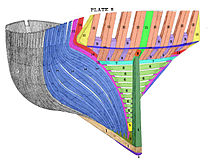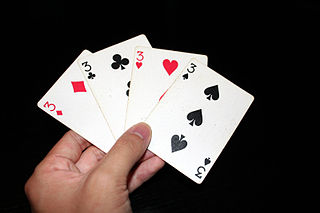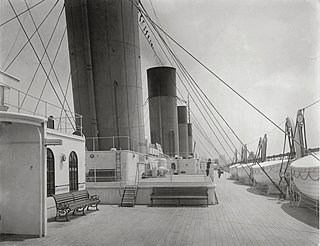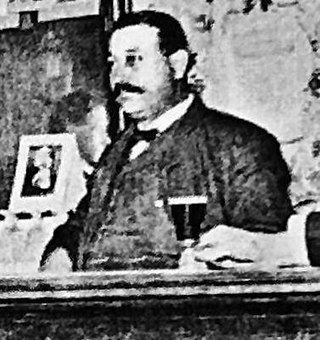Deadwood is the lower part of a ship's stem or stern.


Deadwood is the lower part of a ship's stem or stern.


![]() Media related to Deadwood (ship's stern) at Wikimedia Commons
Media related to Deadwood (ship's stern) at Wikimedia Commons

Gin rummy, or simply gin, is a two-player card game variant of rummy. It has enjoyed widespread popularity as both a social and a gambling game, especially during the mid twentieth century, and remains today one of the most widely-played two-player card games.

Deadwood is a city that serves as county seat of Lawrence County, South Dakota, United States. It was named by early settlers after the dead trees found in its gulch. The city had its heyday from 1876 to 1879, after gold deposits had been discovered there, leading to the Black Hills Gold Rush. At its height, the city had a population of 25,000, attracting Old West figures such as Wyatt Earp, Calamity Jane, and Wild Bill Hickok.

In naval architecture, a poop deck is a deck that forms the roof of a cabin built in the rear, or "aft", part of the superstructure of a ship.

A rudder is a primary control surface used to steer a ship, boat, submarine, hovercraft, aircraft, or other vehicle that moves through a fluid medium. On an aircraft the rudder is used primarily to counter adverse yaw and p-factor and is not the primary control used to turn the airplane. A rudder operates by redirecting the fluid past the hull or fuselage, thus imparting a turning or yawing motion to the craft. In basic form, a rudder is a flat plane or sheet of material attached with hinges to the craft's stern, tail, or after end. Often rudders are shaped so as to minimize hydrodynamic or aerodynamic drag. On simple watercraft, a tiller—essentially, a stick or pole acting as a lever arm—may be attached to the top of the rudder to allow it to be turned by a helmsman. In larger vessels, cables, pushrods, or hydraulics may be used to link rudders to steering wheels. In typical aircraft, the rudder is operated by pedals via mechanical linkages or hydraulics.

Deadwood is an American Western television series that aired on the premium cable network HBO from March 21, 2004, to August 27, 2006, spanning three seasons and 36 episodes. The series is set in the 1870s in Deadwood, South Dakota, before and after the area's annexation by the Dakota Territory, and charts Deadwood's growth from camp to town. The show was created, produced, and largely written by David Milch. Deadwood features a large ensemble cast headed by Timothy Olyphant and Ian McShane, playing the real-life Deadwood residents Seth Bullock and Al Swearengen, respectively. Many other historical figures appear as characters, including George Crook, Wyatt Earp, E. B. Farnum, George Hearst, Wild Bill Hickok, Calamity Jane, Sol Star, A. W. Merrick, Jack McCall, and Charlie Utter. The plot lines involving these characters include historical truths as well as substantial fictional elements. Milch used actual diaries and newspapers from 1870s Deadwood residents as reference points for characters, events, and the look and feel of the show.

A deck is a permanent covering over a compartment or a hull of a ship. On a boat or ship, the primary or upper deck is the horizontal structure that forms the "roof" of the hull, strengthening it and serving as the primary working surface. Vessels often have more than one level both within the hull and in the superstructure above the primary deck, similar to the floors of a multi-storey building, that are also referred to as decks, as are certain compartments and decks built over specific areas of the superstructure. Decks for some purposes have specific names.

Clinker built is a method of boat building in which the edges of hull planks overlap each other. Where necessary in larger craft, shorter planks can be joined end to end, creating a longer strake or hull plank.

A Thames sailing barge is a type of commercial sailing boat once common on the River Thames in London. The flat-bottomed barges with a shallow draught and leeboards, were perfectly adapted to the Thames Estuary, with its shallow waters and narrow tributary rivers. The larger barges were seaworthy vessels, and were the largest sailing vessel to be handled by just two men. The average size was about 120 tons and they carried 4,200 square feet (390 m2) of canvas sail in six working sails. The mainsail was loose-footed and set up with a sprit, and was brailed to the mast when not needed. It is sheeted to a horse, as is the foresail; they require no attention when tacking. The foresail is often held back by the mate to help the vessel come about more swiftly.

David Sanford Milch is an American writer and producer of television series. He has created several television shows, including ABC's NYPD Blue (1993–2005), co-created with Steven Bochco, and HBO's Deadwood.

Charles H. "Colorado Charlie" Utter was a figure of the American Wild West, best known as a great friend and companion of Wild Bill Hickok. He was also friends with Calamity Jane.

Ellis Alfred Swearengen was an American pimp and entertainment entrepreneur who ran the Gem Theater, a notorious brothel, in Deadwood, South Dakota, for 22 years during the late 19th century.
Deadwood is a hamlet in Alberta, Canada within the County of Northern Lights. It is located on Highway 690, approximately 10 kilometres (6.2 mi) east of the Mackenzie Highway, 80 kilometres (50 mi) north of Peace River and 34 kilometres (21 mi) southeast of Manning.

John Marvin Perkins, known professionally as John Hawkes, is an American actor. He is the recipient of several accolades, including two Independent Spirit Awards, and has been nominated for an Academy Award and a Golden Globe Award.

Length between perpendiculars is the length of a ship along the summer load line from the forward surface of the stem, or main bow perpendicular member, to the after surface of the sternpost, or main stern perpendicular member. When there is no sternpost, the centerline axis of the rudder stock is used as the aft end of the length between perpendiculars.

The draft or draught of a ship's hull is the vertical distance between the waterline and the bottom of the hull (keel). The draught of the vessel is the maximum depth of any part of the vessel, including appendages such as rudders, propellers and drop keels if deployed. Draft determines the minimum depth of water a ship or boat can safely navigate. The related term air draft is the maximum height of any part of the vessel above the water.
Madam Dora DuFran or Dora Bolshaw was one of the leading and most successful madams in the Old West days of Deadwood, South Dakota.

The stern is the back or aft-most part of a ship or boat, technically defined as the area built up over the sternpost, extending upwards from the counter rail to the taffrail. The stern lies opposite the bow, the foremost part of a ship. Originally, the term only referred to the aft port section of the ship, but eventually came to refer to the entire back of a vessel. The stern end of a ship is indicated with a white navigation light at night.

The stem is the most forward part of a boat or ship's bow and is an extension of the keel itself. It is often found on wooden boats or ships, but not exclusively.

Martha Jane Cannary, better known as Calamity Jane, was an American frontierswoman, sharpshooter, and storyteller. In addition to many exploits she was known for being an acquaintance of Wild Bill Hickok. Late in her life, she appeared in Buffalo Bill's Wild West show and at the 1901 Pan-American Exposition. She is said to have exhibited compassion to others, especially to the sick and needy. This facet of her character contrasted with her daredevil ways and helped to make her a noted frontier figure. She was also known for her habit of wearing men's attire.

The Sparrow-Hawk was a 'small pinnace' similar to the full-rigged pinnace Virginia that sailed for the English Colonies in June 1626. She is the earliest ship to participate in the first decades of English settlement in the New World to have survived to the present day.